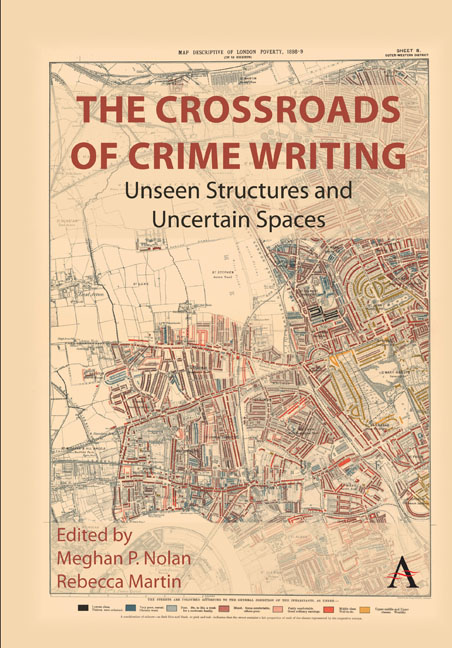Book contents
- Frontmatter
- Contents
- Introduction
- Unseen Structures
- Chapter 1 Unseen Structures and the Outlaw: Depictions of Violations in Stieg Larsson’s Millennium Trilogy
- Chapter 2 Dark Waters: Eco-Noir in New York 2140
- Chapter 3 Between Lenin and Sherlock Holmes: Soviet Militsiya Procedural in Volodymyr Kashin’s Detective Fiction
- Chapter 4 Detecting Justice: Black Crime Fiction and the Novels of Attica Locke
- Chapter 5 The Police and the Private Eye: The Making of Gendered and Racial Peripheralization in the Crime Fiction of Valerie Wilson Wesley
- Uncertain Spaces
- Chapter 6 Navigating the Carceral City: Calcutta in Late Nineteenth-Century Narratives of Detection
- Chapter 7 Traversing the Borders of Poverty and Morality: The Intersection of Maps and Upper-Class Ethics in Anne Perry’s Neo-Victorian Series
- Chapter 8 Facts and Fictions: The Liminal Space Between True Crime and Crime Fiction
- Chapter 9 The Success(Ion) and Corruption of Crime Genres in Jo Nesbø’s Macbeth (2018)
- Chapter 10 The Golden Age Meets the Age of Aquarius: Agatha Christie in the 1960s
- Notes on Editors and Contributors
- Permissions
- Index
Chapter 10 - The Golden Age Meets the Age of Aquarius: Agatha Christie in the 1960s
Published online by Cambridge University Press: 13 April 2024
- Frontmatter
- Contents
- Introduction
- Unseen Structures
- Chapter 1 Unseen Structures and the Outlaw: Depictions of Violations in Stieg Larsson’s Millennium Trilogy
- Chapter 2 Dark Waters: Eco-Noir in New York 2140
- Chapter 3 Between Lenin and Sherlock Holmes: Soviet Militsiya Procedural in Volodymyr Kashin’s Detective Fiction
- Chapter 4 Detecting Justice: Black Crime Fiction and the Novels of Attica Locke
- Chapter 5 The Police and the Private Eye: The Making of Gendered and Racial Peripheralization in the Crime Fiction of Valerie Wilson Wesley
- Uncertain Spaces
- Chapter 6 Navigating the Carceral City: Calcutta in Late Nineteenth-Century Narratives of Detection
- Chapter 7 Traversing the Borders of Poverty and Morality: The Intersection of Maps and Upper-Class Ethics in Anne Perry’s Neo-Victorian Series
- Chapter 8 Facts and Fictions: The Liminal Space Between True Crime and Crime Fiction
- Chapter 9 The Success(Ion) and Corruption of Crime Genres in Jo Nesbø’s Macbeth (2018)
- Chapter 10 The Golden Age Meets the Age of Aquarius: Agatha Christie in the 1960s
- Notes on Editors and Contributors
- Permissions
- Index
Summary
Introduction
Agatha Christie's work has traditionally been regarded as emblematic of the Golden Age of Detective Fiction, which covers the twenty or so years between the two world wars. Her first novel, The Mysterious Affair at Styles, was published in 1920, and her most famous works—The Murder of Roger Ackroyd (1926), Murder on the Orient Express (1934), Death on the Nile (1937)—are products of this period as well. This timeframe is aptly referred to as the Golden Age because the most widely read and influential novels of Dorothy Sayers, Ngaio Marsh, John Dickson Carr, S. S. Van Dine, and Marjorie Allingham were written at the time as well. Yet to limit Christie's achievement to the years between the two world wars is a failure to acknowledge the fact that Christie, as well as several other Golden Age authors, continued to produce major work after 1940. In Christie's case, she continued to write until the mid-1970s, and the later books comment on the changing mores and values of the times, most interestingly those associated with the young generation of the mid and late nineteen sixties. As a result, analyzing these late novels demonstrates that the label “Golden Age” and the years 1920–1940 as its time period are both “uncertain spaces” that need to be qualified by attention to the entire span of Christie's career.
What I will discuss here primarily are some of the novels she published between 1965 and 1970, books in which she depicted the youth culture of those turbulent years: the rebelliousness, the rejection of authority, the widespread bohemianism that involved drugs and the relaxation of sexual standards. This is a world far removed from the country estates or middle-class tourist life she commonly treated in the past, and her vision of the world is darker, with the books taking on their own noirish sensibility. Five books from this period—At Bertram's Hotel (1965), Third Girl (1966), Endless Night (1967), Hallowe’en Party (1969), and Passenger to Frankfurt (1970)—include references to the new youth culture that was exploding in the Western world.
- Type
- Chapter
- Information
- The Crossroads of Crime WritingUnseen Structures and Uncertain Spaces, pp. 209 - 224Publisher: Anthem PressPrint publication year: 2024



